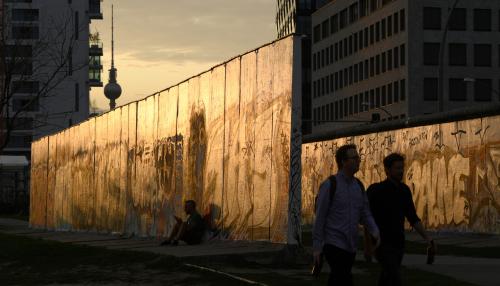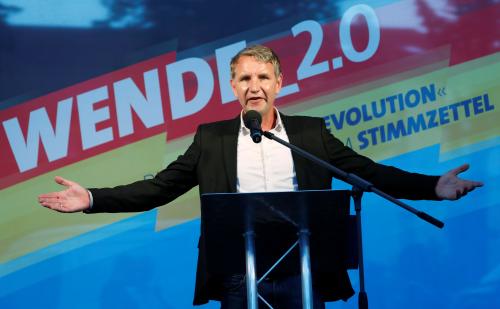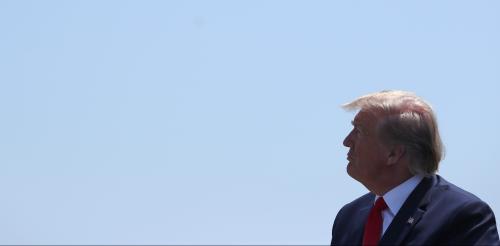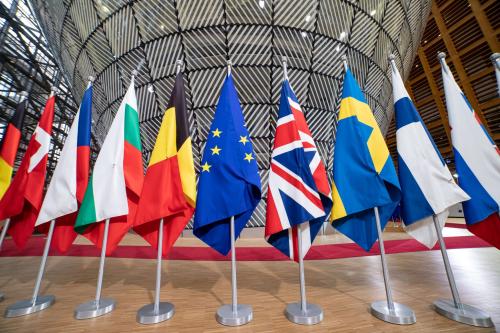30 years after the fall of the Berlin Wall, the very notion of a modernity based on objective, evidence-based knowledge is under attack, argues Constanze Stelzenmüller. This post originally appeared in the Financial Times.
A popular joke of the Soviet era ran like this: A listener calls up Radio Yerevan with a question: “Is it possible,” he asks, “to foretell the future?” Answer: “Yes, no problem. We know exactly what the future will be. Our problem is with the past: that keeps changing.”
The anniversary this year of the revolutions of 1989, which brought about the end of communist rule in Europe, was a reminder of how the past can shape-shift. Dark episodes of history that were thought to be buried rose back into public consciousness like the undead.
The awarding of the 2019 Nobel Prize for literature to Peter Handke sent waves of outrage though the Balkans and beyond. The Austrian is held to be one of the great living writers in the German language. But he has also minimised the mass murder of Muslims by Bosnian Serbs during the Yugoslav wars of the 1990s. He spoke at the funeral of Slobodan Milosevic, the wartime president of Serbia who died while on trial for war crimes. In a furious response, the Bosnian-American writer Aleksandar Hemon called Mr Handke “the Bob Dylan of genocide apologists”.
In Germany, a wealthy couple of technology entrepreneurs bought the Berliner Zeitung, a former East German newspaper. In an edition timed to coincide with the 30th anniversary of the fall of the Berlin Wall, Holger and Silke Friedrich, born in East Germany, shocked many readers with an editorial urging a comprehensive reassessment of the reunified country’s past and present.
Later it emerged that Mr Friedrich had once been an informant for the Stasi, the feared East German secret police. A meticulous examination of his file by a former head of the Stasi archives and a historian found Mr Friedrich’s collaboration had been short, reluctant, and mostly unproductive. Yet they also noted that the available documents never tell a fully reliable story.
The Friedrichs’ manifesto was arguably the more explosive revelation. It blamed the annexation of Crimea and the war in eastern Ukraine on the west’s unwillingness to grasp Russian president Vladimir Putin’s “outstretched hand”. They argued Germans should be grateful to Egon Krenz, the GDR’s last communist leader, for not giving orders to shoot at peaceful protesters.
Some of the world’s most powerful men have been playing fast and loose with facts lately. In his annual, marathon and highly-staged press conference in mid-December, Mr Putin defended the Molotov-Ribbentrop neutrality pact of 1939 between Russia and Germany, with the untruthful claim that the Soviet Union had been the last state in Europe to sign a non-aggression pact with Nazi Germany.
Mr Putin also opined that US President Donald Trump had been impeached “based on what are, in my opinion, completely fabricated reasons” — a quote seized upon by Mr Trump in a triumphant tweet: “A total Witch Hunt!” The most recent count by the Washington Post’s Factchecker database lists “15,413 false or misleading claims over 1,055 days” by Mr Trump.
Back in 1989, the historian Francis Fukuyama speculated that the events surrounding the fall of the Berlin Wall might herald “the end of history as such”, by which he meant: the end of ideology and the victory of the liberal consensus. Yet, 30 years later, it is not just western liberalism that is under attack from without and within, but the very notion of a modernity based on objective, evidence-based knowledge.
Mr Handke’s Nobel lecture in Stockholm may have floated so far above politics that it approached the gnomic (“show your true colours till you prove to be right” he mused). But to his experienced critics it reprised worrying tropes of cultural pessimism that have run through his work: nature as the only source of revealed truth, village life as the centre of all belonging, and the corruptness of modern life.
Yet there was a second Nobel Prize in literature handed out that evening. Last year, the Swedish academy postponed the award because of a sexual harassment scandal. So this year, the 2018 prize was awarded to the Polish writer Olga Tokarczuk, who has tangled with her own country’s nationalists on issues including xenophobia and anti-Semitism. In her Nobel lecture, Ms Tokarczuk tackled the problem of truth-telling head-on. Cultural fragmentation, she said, risks turning us into “followers of simple forces — physical, social, and economic — moving us around as if we were zombies”.
Nonetheless, she argued, the climate and political crises we see today are not the result of “a twist of fate or destiny”, but of man-made decisions. Organising the facts, establishing cause and effect, she added, is a writer’s task — but it is also how societies recover a shared past, and the possibility of a shared future.







Commentary
Shadows of the past threaten Europe’s shared future
December 30, 2019